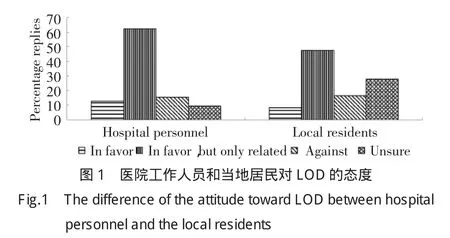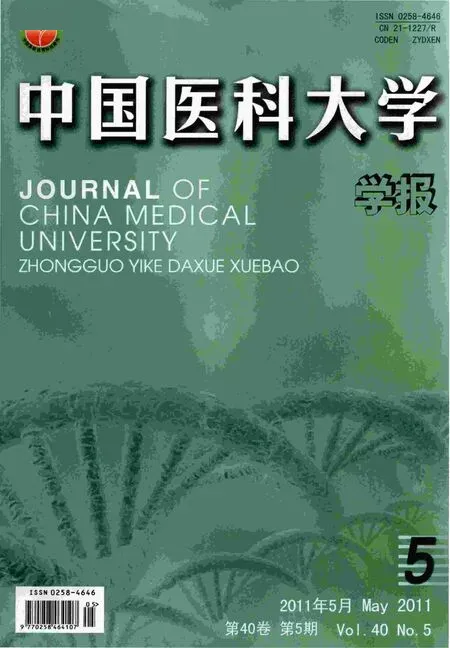医院工作人员对活体器官捐献的态度及其影响因素分析
刘宝林,尚宾,刘世庆,陈洋,陈爱山,孙威,殷红专,苏琪
(中国医科大学附属盛京医院外科,沈阳 110004)
医院工作人员对活体器官捐献的态度及其影响因素分析
刘宝林,尚宾,刘世庆,陈洋,陈爱山,孙威,殷红专,苏琪
(中国医科大学附属盛京医院外科,沈阳 110004)
目的调查医院工作人员对活体器官捐献的态度,并分析其影响因素。方法 按工作部门和职业种类对医院工作人员分层,随机选取600人作为研究对象。同时于当地社区随机抽取150人作为对照组。采用问卷方式对医院工作人员及对照组进行调查。应用Student’st检验和χ2检验对数据进行分析。结果 医院工作人员比当地居民更愿意进行活体器官捐献(75.0%vs 55.6%,P=0.000)。医院工作人员对活体器官捐献的态度与以下3类因素相关:(1)心理社会因素;(2)家庭因素;(3)与其他形式的捐献器官或接受捐献器官相关的因素。结论与居民相比,医院工作人员更愿意进行活体器官捐献。家庭因素、利他主义行为和互助合作精神与此种态度密切相关。
态度;活体供体;器官移植;尸体
目前,器官移植是治疗许多急、慢性终末期器官疾病唯一有效的方法。然而由于供体的缺乏,全世界每年有大量的终末期器官疾病患者在等待器官移植的过程中死亡[1]。
中国是世界上患终末期器官疾病人口最多的国家,然而受东方传统文化的影响,中国人对脑死亡的接受程度不高,国内目前尚无脑死亡立法,这使得在中国开展尸体器官移植十分困难[2]。为了增加供体来源,缓解器官供求矛盾,人们开展了一系列技术,这其中包括劈离式肝移植,多米诺肝移植等,然而这仍然远远不能满足临床需求[3]。虽然异种器官移植和干细胞移植有很大的发展前景,然而距离其投入临床应用尚有相当距离[4]。在此背景下,活体器官移植在中国得到迅速广泛的开展,成为解决日益尖锐的器官供求矛盾的有效方法之一[5]。
然而,活体器官捐献(living organ donation,LOD)对于供体有较高的危险,这使得供体及其家属很难做出捐献决定。绝大多数供体在捐献器官之前都会向医院工作人员尤其是医生咨询,因此医院工作人员对LOD的态度对于供体的捐献意愿具有重要影响。若医院工作人员对LOD表示支持,则会创造一个良好的社会环境和氛围,有利于活体器官移植(living organ transplantation,LOT)的开展[6]。本研究的目的是调查国内医院工作人员对LOD的态度,并研究影响此态度的因素。
1 材料和方法
1.1 研究人群
本研究在我国东北地区一所具有LOT资格的医科大学附属医院进行。按临床工作部门(内科,外科,妇产科,儿科,医辅科室)和职业种类(医生,护士)对人群进行分层,从中随机选取600人作为研究对象。同时,在当地社区中随机选取150人作为对照组。
1.2 调查问卷
综述相关文献,并结合我国的实际情况,制定调查问卷,研究医院工作人员对LOD的态度[6,7]。于2008年7月至10月间,在每个工作日的工作时间内,向医院工作人员发放问卷;在节假日期间向对照组发放问卷。问卷的发放和解释采取面对面的方式。调查问卷为采取匿名形式,由受调查者本人填写,每份问卷的填写时间约为3~5min。
1.3 研究因素
本研究中,将医院工作人员对LOD的态度作为因变量,将研究因素设为自变量。研究因素被分成3类,分别为:(1)心理社会因素:年龄,性别,婚姻状态,工作部门,职业种类,教育程度,参加公益活动的状况;(2)家庭因素:是否与家人讨论过器官捐献或器官移植,是否同意家人捐献器官,配偶对器官捐献的态度;(3)与其他形式的器官捐献或接受捐献器官医院相关的因素:对尸体器官捐献的态度,自己将来是否需要进行器官移植,是否愿意接受活体器官,是否愿意接受尸体器官。
1.4 统计分析
调查数据储存在数据库中,应用SPSS15.0统计软件对其进行统计分析。应用Student’st检验及χ2检验对上述研究因素进行单因素分析。在所有的统计分析中,P<0.05为差异有统计学意义。
2 结果
2.1 医院工作人员及对照组对LOD的态度
医院工作人员和对照组的问卷填写率分别为97.7%(n=586)和 64.7%(n=97)。在医院工作人员中,只有12.9%(n=73)同意进行活体非亲属器官捐献,62.1%(n=353)只同意进行活体亲属器官捐献(living related organ donation,LROD),15.5%(n=88)不同意进行LOD,其余9.5%(n=54)则表示不知道(见图1)。在对照组中,8.2%(n=8)同意进行活体非亲属器官捐献,47.4% (n=46)只同意进行LROD,16.5%(n=16)不同意进行 LOD,其余 27.8%(n=27)则表示不知道。与对照组相比,医院工作人员更愿意进行 LOD(75.0%vs 55.6%,P=0.000)。

2.2 单因素分析
对研究因素的单因素分析表明,医院工作人员对活体器官捐献的态度主要与以下因素相关。
(1)心理社会因素:包括年龄(P=0.018),性别(P=0.010),职业种类(P=0.000),学历水平(P=0.004),参加公益活动的状况(P=0.012)等因素与医院工作人员对LOD的态度有相关性;工作部门和婚姻状态则与此态度无关。
(2)家庭相关因素:包括是否与家人讨论过器官捐献或器官移植(P=0.019),是否同意捐献家人器官(P=0.000),配偶对器官捐献的态度(P=0.000)。
(3)与其他形式的捐献器官或接受捐献器官相关的因素:包括对尸体器官捐献的态度(P=0.000),自己将来是否需要进行器官移植(P=0.035),是否愿意接受活体器官(P=0.000),是否愿意接受尸体器官(P=0.000)。
3 讨论
尽管在东方国家LOT开展得比西方国家更加广泛,然而其关于公众对LOD态度的研究则较少,国内目前尚无此方面研究资料。本研究中我们发现,我国的大部分医院工作人员对LOD,尤其是LROD表示赞同。这对于我国开展 LOT 具有重要意义[6,8,9]。
家庭因素在LOD的决定过程中起着重要的作用[6,7,9]。本研究发现,大部分家庭成员对捐献者的决定表示尊重,然而在进行LOD之前,绝大多数捐献者都会与家人讨论,征得家人尤其是配偶的同意。因此我们需要强调与家人尤其是配偶讨论此话题的重要性。
受调查者对LOD的态度与其对其他形式的器官捐献的态度有着密切关系[6,7]。器官捐献是一种利他主义行为。通常情况下,若人们同意某种形式的器官捐献,对其他形式的器官捐献亦会表示赞同。然而这种行为并非是绝对无私的,在付出的同时,人们同样要求回报。我们称之为互助合作精神。在本研究中我们发现了与这种精神有关的因素,即自己将来是否有可能需要进行器官移植,如果需要的话是否愿意接受捐献的器官。从某种意义上讲,器官捐献也是一种公益性的活动,因此,积极参与公益活动的人更加愿意进行LOD。这种互助合作精神不仅仅只体现在生理方面,亦体现在心理方面[2]。通过LOD,供体得到了良好的社会评价,进一步改善了与受体之间的关系,这一点在父母向子女捐献器官的过程中表现的更为明显[6]。
此外,我们还发现了两项对LOD有利的因素。其一,医生比护士更加愿意进行LOD。其二,受教育程度最高和最年轻的受调查者最倾向于进行LOD。通常情况下,医院里新的理念,新的技术最先由受教育程度高的医生所接受和开展[11]。这意味着对于LOT的开展,我们有着坚实的基础和光明的前景。与医院工作人员相比,当地居民中愿意进行LOD的比例较低,表示“不知道”的比例则较高。这表明了群众对于LOD缺乏足够的认知。医院工作人员对LOD的支持态度为我们促进LOT的开展提供了一个有利条件。我们应该充分的利用这一有利条件来提高公众对LOD的认知,促进LOT的开展[12]。然而,由于LOD对供体具有一定的风险,对于开展LOT我们必须小心谨慎,最好在具备丰富临床经验的大中心进行,从而避免给供体带来不必要的伤害[13]。
与当地居民相比,医院工作人员更愿意进行LOD。家庭因素,利他主义行为与互助合作精神与此种态度密切关系。此外,医生和受教育程度高的年轻人最愿意进行LOD,这使得我们相信LOT有着光明的发展前景。如果我们能够很好的进行宣教活动,提高公众对LOD的认知程度,我们相信,未来几十年LOT在我国能得到长足的发展,从而挽救更多终末期器官疾病患者的生命。
[1]Devlin J,O’Grady J.Indications for referral and assessment in adult organ transplantation:a clinical guideline [J].Gut,1999,45(Suppl6):Ⅵ1-Ⅵ22.
[2]Chen SC,Hsu HT,Hwang SL,et al.Attitude toward living donor organ transplantation in Taiwan [J].Transplant Proc,2006,38(7):2108-2110.
[3]Ramírez P,Ríos A,Sánchez Bueno F,et al.Trasplante hepático split para dos adultos[J].Gastroenterol Hepatol,2004,27(Suppl 4):52-57.
[4]Ríos A,Conesa C,Ramírez P,et al.Hospital personnel faced with organ xenotransplantation:an attitudinal survey in a hospital with a pre-clinical organ xenotransplantation program[J].Xenotransplantation,2006,13(5):447-454.
[5]Strong RW,Lynch SV,Ong TH,et al.Successful organ transplantation from a living donor to her son [J].N Engl J Med,1990,322(21):1505-1507.
[6]Ríos A,Ramírez P,Rodríguez MM,et al.Attitude of hospital personnel faced with living organ donation in a Spanish center with a living donor organ transplant program[J].Organ Transplant,2007,13(7):1049-1056.
[7]Ríos A,Ramírez P,Galindo PJ,et al.Ancillary personnel faced with living organ donation in a Spanish hospital with a transplant program[J].Rev Esp Enferm Dig,2006,98(12):917-928.
[8]Dahlke MH,Popp FC,Eggert N,et al.Differences in attitude toward living and postmortal organ donation in the United States,Germany,and Japan[J].Psychosomatics,2005,46(1):58-64.
[9]Neuberger J,Farber L,Corrado M,et al.Living organ donation:a survey of the attitudes of the public in Great Britain [J].Transplantation,2003,76(8):1260-1264.
[10]Popp FC,Eggert N,Hoy L,et al.Who is willing to take the risk?Assessing the readiness for living organ donation in the general German population[J].J Med Ethics,2006,32(7):389-894.
[11]Burra P,Bona MD,Canova D,et al.Changing attitude to organ donation and transplantation in university students during the years of medical school in Italy[J].Transplant Proc,2005,37(2):547-550.
[12]Lee SH,Jeong JS,Ha HS,et al.Decision-related factors and attitudes toward donation in living related organ transplantation:tenyear experience[J].Transplant Proc,2005,37(2):1081-1084.
[13]Nadalin S,Malago M,Radtke A,et al.Current trends in live organ donation[J].Transpl Int,2007,20(4):312-330.
(编辑孙宪民,英文编辑赵传胜)
The Attitude of Hospital Personnel Toward Living Organ Donation and Analysis of Its Impact Factors
LIU Bao-lin,SHANG Bin,LIU Shi-qing,CHEN Yang,CHEN Ai-shan,SUN Wei,YIN Hong-zhuan,SU Qi
(Department of Surgery,Shengjing Hospital,China Medical University,Shenyang 110004,China)
ObjectiveTo analyze the attitude of hospital workers and its impact factors toward living organ donation in a hospital with an authorized living organ transplant program in the Northeast of China.MethodsA randomized sample was selected and stratified according to the working departments and kinds of job(n=600)and 150individuals were randomly chosen from the local community as the control group.The attitude was evaluated by a modified psychosocial questionnaire.The questionnaire was completed anonymously and was self-administered.Statistical analysis included the Student’sttest and χ2test.ResultsCompared with the control group,the hospital personnel had a much more favorable attitude toward living organ donation(73.5%vs 55.6%,P=0.000).The impact factors were divided into three groups:1)psychosocial factors(age;sex;marital status;education;department of service,job category;participation in prosocial activities);2)family factors(attitude of a respondent’s partner toward organ donation;the decision of donating the organs of a family member;family discussion about organ donation and transplantation);3)factors related to attitude toward other forms of human organ donation and the willingness to accept the organs if needed(attitude toward cadaveric organ donation;a respondent’s belief of needing a transplant in the future;the willingness to receive a donated living organ if one were needed;the willingness to receive a donated cadaveric organ if one were needed).ConclusionThere is a favorable attitude of hospital workers toward living organ donation in China.Family factors are closely related to this attitude.And this attitude is related to altruistic activities and feelings of reciprocity.Besides,doctors and the youngest well-educated respondents are those who are most in favor,which make us believe that there is a promising future of living organ donation and transplantation in China.
attitude;living donor;organ transplantation;cadaver
R617
A
0258-4646(2011)05-0428-03
doiCNKI:21-1227/R.20110523.1813.006
http://www.cnki.net/kcms/detail/21.1227.R.20110523.1813.006.html
国家自然科学基金资助项目(30972908);沈阳市科技局基金资助项目(F10-205-1-36)
刘宝林(1965-),男,副教授,博士.E-mail:liubl55@hotmail.com
2011-01-17
网络出版时间:2011-05-1815:25

